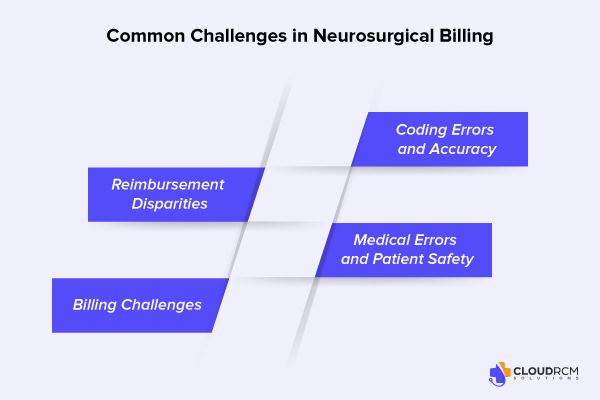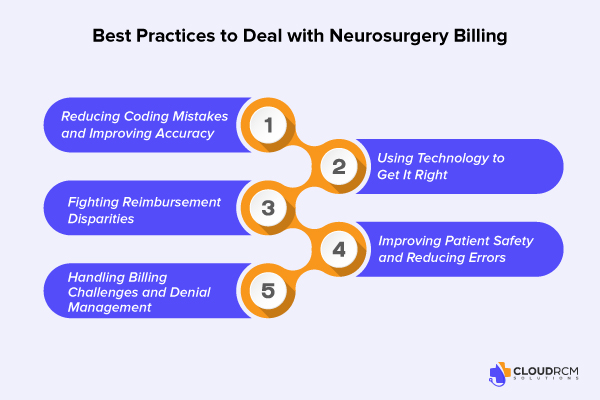Neurosurgery billing is complex and requires close attention. The intricate nature of neurosurgery services makes accurate billing and coding challenging, often resulting in errors, claim rejections, and payment delays that impact your practice’s revenue and create financial uncertainty. With the 2025 Medicare Physician Fee Schedule reducing the conversion factor by 2.83% to $32.3465, neurosurgeons face further declines in reimbursements, while the specialty continues to struggle with claim denial rates as high as 18%.
In this blog, we’ll explore how to address these challenges, minimise errors, and increase revenue, allowing you to focus on patient care.
Why Is Billing And Coding Crucial For Neurosurgery or Neurology?
Billing and coding services are crucial for neurosurgery practices to ensure accurate reimbursement for complex procedures. By using precise coding, these services prevent revenue loss from claim denials and underpayments. They also improve the administrative tasks, speeding up claims submission and payment posting while keeping up with changing regulations. This helps maintain financial stability, so neurosurgeons can focus on patient care instead of paperwork.
Neurosurgery Billing & Coding Overview
Neurosurgery billing and coding involve several key steps to ensure smooth operations and accurate payments:
- Insurance Verification: Confirm patient coverage before services are provided to avoid any surprises.
- Review of Medical Records: Ensure all necessary details, from diagnosis to treatments, are accurately documented.
- Charge Entry: Assign the correct codes and values to patient accounts based on the services provided.
- Submitting Claims: Submit claims quickly to insurance companies for faster reimbursement.
- Payment Posting: Update patient accounts promptly when payments are received to keep everything up to date.
- Managing Accounts Receivable: Track and collect outstanding payments to maintain a steady cash flow for the practice.
Additional Considerations:
- Denial Management: Implement strategies to minimize claim denials and manage appeals effectively.
- Medical Coding: Utilize standardized codes to document diagnoses and treatments accurately.
- Revenue Cycle Management: improve processes to reduce receivable days and boost overall collections.
What Are The Common Challenges In Neurology Billing?

Neurosurgeons face several billing and coding challenges that can affect their reimbursement and compliance:
Coding Errors and Accuracy
A study of neurosurgical coding showed that 18.4% of patient cases had at least one coding mistake, leading to a revenue loss of about £111 per case. Most of these errors (85%) were due to changes in coding, highlighting how important it is to stay accurate and consistent.
Reimbursement Disparities
Research into Medicare data found that female neurosurgeons are often reimbursed less than their male colleagues for the same procedures. This points to the need for fair and equal reimbursement practices across the board.
Medical Errors and Patient Safety
A review of medical errors in neurosurgery revealed that errors were found in 12% to 88.7% of cases, with only 23.7% to 27.8% being actual surgical mistakes. The majority of errors were linked to larger systemic issues, which shows the importance of improving overall quality in the field.
Billing Challenges
Billing specialists in neurosurgery often face claim denials due to coding errors or issues like lack of medical necessity. It’s essential to have strong denial management practices in place, including quick appeals and clear communication with insurance providers, to ensure correct reimbursement.
Specialized Neurosurgery Billing Services
At CloudRCM Solutions, we understand the unique challenges that come with billing for different neurosurgical subspecialties. Our team of certified specialists is well-versed in the specifics of each area and provides tailored solutions to meet your practice’s needs.
- Neurotrauma & Brain Injuries
- Spinal Cord Injury
- Tumor Therapy & Radiosurgery
- Stereotactic Neurosurgery
- Pediatric Neurosurgery
- Vascular Neurosurgery
By aligning our services with subspecialty-specific requirements, we ensure accurate coding, streamlined claims, and better revenue outcomes.
Best practices to deal with Neurosurgery billing:

Neurosurgery billing can be tricky, with challenges like coding errors, reimbursement issues, and claim denials. These obstacles often lead to payment delays, lost revenue, and stress for both doctors and their admin teams. Since neurosurgery procedures are complex, it’s clear that billing and coding need special attention. At CloudRCM Solutions, we get these challenges and are here to offer practical solutions, including:
Reducing Coding Mistakes and Improving Accuracy
We conduct regular audits, offer coder training, and use smart tools to make sure everything is coded correctly. Reducing the mistakes in coding means more accuracy and accuracy leads to better reimbursement rates and fewer denials.
Using Technology to Get It Right
Our advanced coding systems and real-time validation help prevent errors and minimize claim rejections. Using technology can help you minimize errors in the claim process and improve accuracy.
Fighting Reimbursement Disparities
We work to ensure fair reimbursement by making sure all documentation is thorough and keeping an eye out for any patterns of unfair payment.
Improving Patient Safety and Reducing Errors
We focus on quality assurance and provide ongoing safety training to keep everyone involved in the process up to date.
Handling Billing Challenges and Denial Management
We implement clear denial management strategies, quick appeals, and open communication with insurers to make sure you get paid on time.
Regulatory and Compliance Updates in Neurosurgery Billing
Neurosurgery billing and coding are subject to frequent changes in healthcare regulations and payer policies. Staying updated is crucial to ensure compliance and avoid reimbursement delays. For example, the 2024 Medicare Physician Fee Schedule reduced the conversion factor by 3.37%, affecting reimbursements for neurosurgery services. Additionally, new CMS guidelines may impact how neurosurgical procedures are reported and reimbursed.
Financial Benefits of Professional Billing Services
- Outsourcing neurosurgery billing to CloudRCM Solutions can boost your practice’s financial health.
- We minimize errors, optimize coding accuracy, and implement denial management strategies to ensure full reimbursement.
- Our team provides valuable insights into revenue cycle trends, helping you make data-driven decisions for maximising profitability.
Neurosurgery CPT Codes and Modifiers
Neurosurgery CPT codes are essential for billing various procedures such as craniotomy, stereotactic surgery, and spinal surgery. Modifiers can be applied alongside these codes to indicate specific aspects of the procedure. Below is a breakdown of common neurosurgery CPT codes, modifiers, and key coding tips.
Common Neurosurgery CPT Codes
| Procedure Description | CPT Code Range |
| Craniotomy and Craniectomy | 61500-61576 |
| Stereotactic and Radiosurgery | 61720-61791 |
| Neurostimulator Procedures | 61850-61892 |
| Spinal Surgeries | 63030, 63047, 63710 |
Neurosurgery Modifiers
| Modifier Description | Modifier Code |
| Stereotactic Navigation, Intradural | +61781 |
| Stereotactic Navigation, Extradural | +61782 |
| Use of the Operating Microscope | +69990 |
Coding Tips:
- For noncontiguous defects, report CPT codes 22853 or 22854 for each.
- Treatment of a fracture/dislocation (codes 22325–22328) and arthrodesis (codes 22548–22812) should be reported separately.
Take Your Practice to the Next Level with CloudRCM Solutions:
Neurosurgery billing and coding demand specialized knowledge and precision. At CloudRCM, our certified coders are experts in neurosurgery procedures, with a deep understanding of ICD-10-CM, HCPCS Level II, and CPT coding. We ensure accurate, compliant coding for neurosurgery practices.
By partnering with us, your clinic can improve its billing processes, ensuring timely reimbursement and maximizing revenue potential. Let us handle the details so you can focus on what matters most to your patients.
Final thought:
Neurosurgery billing is complex and requires expertise to deal with the challenges effectively. By partnering with CloudRCM Solutions, you gain access to a team of professionals who are well-versed in the complexities of neurosurgery billing, ensuring accurate coding, faster reimbursements, and optimized revenue for your practice. Stay ahead of the curve with up-to-date regulatory knowledge and tailored strategies that enhance your financial outcomes while allowing you to focus on what truly matters providing exceptional patient care.
Schedule an appointment today or call (224) 231-6880 to get expert billing and RCM services that take your practice to the next level.
FAQS
What are the primary CPT code ranges used for common neurosurgical procedures?
Codes beginning with “61” cover intracranial procedures like craniotomies, while codes starting with “62” are typically for spinal surgeries.
How do I accurately code for a complex procedure involving multiple steps or approaches?
Break down the procedure into its components, use appropriate modifiers, and consult the most specific codes to cover each distinct step.
What are some common coding errors to watch out for in neurosurgery billing?
Common errors include incorrectly applying modifiers, failing to report all procedure steps, and using outdated code versions.
How do I ensure proper documentation for a neurosurgical procedure to support accurate coding?
Maintain detailed operative notes, ensure all stages of the procedure are clearly documented, and confirm the medical necessity of each step.
What resources are available to stay updated on the latest neurosurgery coding guidelines?
Utilize resources like the AMA’s CPT code updates, CMS guidelines, and professional organizations such as the American Association of Neurological Surgeons (AANS).

 Medical Billing
Medical Billing Medical Coding
Medical Coding Medical Audit
Medical Audit Provider Credentialing
Provider Credentialing Denial Management
Denial Management A/R Follow-up
A/R Follow-up Private Practice
Private Practice Patient Help Desk
Patient Help Desk Customized Reporting
Customized Reporting Out-of-Network Billing
Out-of-Network Billing Internal Medicine
Internal Medicine Pediatrics
Pediatrics Radiology
Radiology Surgery
Surgery Emergency Medicine
Emergency Medicine Anesthesiology
Anesthesiology Cardiology
Cardiology Orthopedic
Orthopedic Psychiatry
Psychiatry Dentistry
Dentistry OB-GYN
OB-GYN Family Medicine
Family Medicine